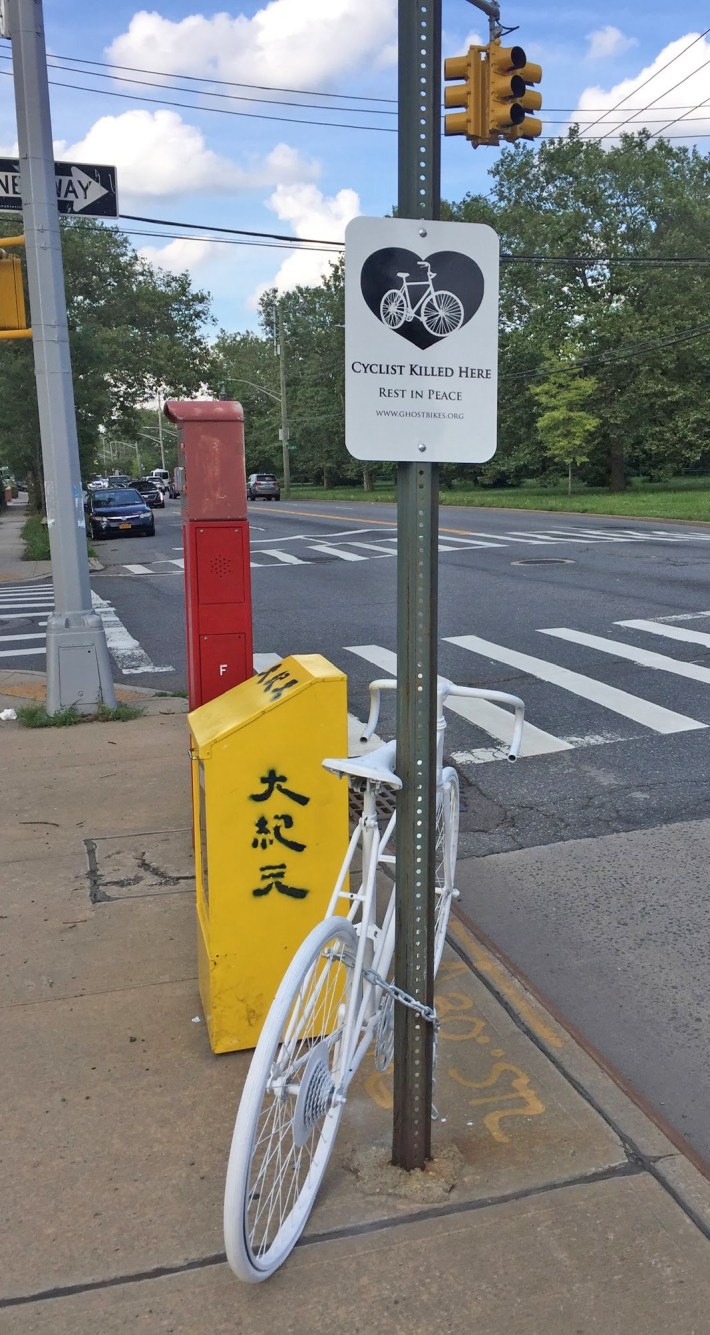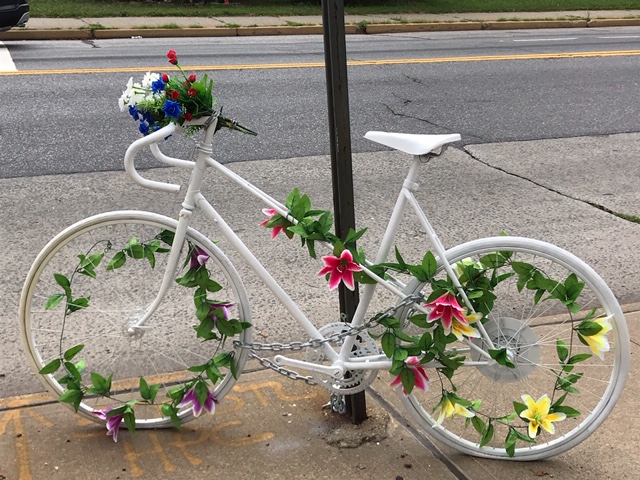Updated | The family of cyclist Robert Sommer is blasting the Parks Department for its ghoulish decision to secretly remove the ghost bike tribute to the dead biker, calling the "outrageous" act nothing short of "grave robbery."
The white-painted bike had been installed on June 25 for Sommer, who died on May 12 when he was hit in Marine Park by a 20-year-old male motorist who was not charged. The Parks Department removed the ghost bike on or about July 9 — the same day that 1,000 cyclists gathered in Washington Square Park for a "die-in" to protest the increase in road fatalities.

"Installation of memorials on parks property, including the perimeters of parks that we maintain, requires official authorization," a Parks Department rep wrote to Steve Scofield, who volunteers with the Ghost Bike Project. "When the public installs impromptu memorials on parkland, we allow a grace period of one month before removal."
The department did not follow its own guidelines, waiting only 16 days before removing the tribute from the crash site at Avenue U near E. 33rd Street. Scofield said he was not aware of any "official" authorization process.
A relative of Sommer said the family was blindsided by the removal because survivors had been "assured" by park rangers that the ghost bike was being cared for.
"They assured me that as long as there are no burning candles and we keep the area clean and safe the memorial could remain," Myrna Roman told Scofield in an email.
She said the family was stunned to hear that the bike had been removed.

"Here we are today unable to understand what I can only describe as the equivalent of grave robbery," said Roman, an aunt. "This act is heartbreaking and outrageous at the same time. There exist miserable, malcontent, misfits who only understand destruction.
"Thank goodness not all of us are like them. Apparently, they have never known the kind of love, kindness and generosity that Rob showered everyone with. Rob, in heaven, has already forgiven them," Roman added.
Scofield told Streetsblog he will fight the Parks Department's move.
"I escalate this much as necessary to have this bike ghost bike restored," he said.
It is unclear why Parks officials cracked down at this particular moment. The city is in the midst of a possibly unprecedented rise in cyclist deaths, with 15 bike riders being killed so far this year, up from 10 all of last year. Sommer was the eighth casualty.
It's also unclear why some ghost bikes seem to be permitted to stay on Parks property without issue. There is a ghost bike for Madison Lyden on the edge of Central Park at West 67th Street, for example. That ghost bike was temporarily removed for the Thanksgiving Day parade, but has been restored.
After initial publication of this story, the Parks Department sent Streetsblog a statement from the agency's Brooklyn Borough Commissioner Martin Maher:
On behalf of NYC Parks, I sincerely apologize that the Robert Sommer’s ghost bike memorial was removed without contacting the family beforehand. The removal was not intended as an affront to those mourning Robert’s passing. We respect his memory, and will ensure that other memorials in our parks are handled with care and sensitivity.
The agency also said that whomever removed the bike did so in violation of a new policy that was put into effect in April. The new policy, however, suggests that ghost bikes will not be allowed to remain on parks property beyond two weeks:
- Patrons looking to start/place a memorial should contact their local Parks Borough Operations office so that a location can be agreed upon, get contact information, and affirm the regulation.
- Memorials on parkland may be placed at the site of someone’s death for a maximum of two weeks’ time after which Parks will remove.
- With the exception of flowers and candles, Parks will store any removed memorials for up to one month while we make a good faith effort to contact the family of the deceased or whomever placed the memorial in order to return memorial materials.
- While 311 does not recognize ghost bikes as abandoned property, it is a memorial and as such, must comply with our regulations.
Update: An earlier version of this story attributed a Parks letter to Scofield as coming from the commissioner himself. That was not the case.






